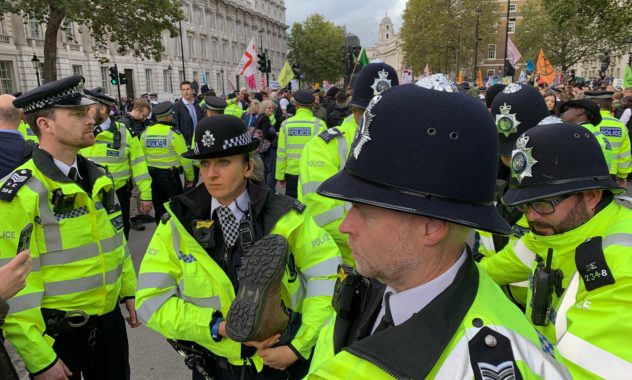Policing Bill “oppressive and wrong” says Human Rights Committee
Both MPs and two-thirds of the public say they would be concerned about plans to criminalise protest.

The Police, Crime, Sentencing and Courts Bill, which the government has announced will go ahead despite a widespread backlash against its authoritarian approach to lawful protest, has been described as “oppressive and wrong” by a Parliamentary committee on human rights.
Reviewing Part 3 of the Bill, which would impose new restrictions on the right to protest, including severe penalties for making too much noise, the Joint Committee on Human Rights warned that the government’s proposals undermine its citizens’ rights to freedom of expression and freedom of association.
These rights are enshrined in Articles 10 and 11 of the European Convention on Human Rights (ECHR), to which the UK is a signatory.
“One of our most fundamental rights is to protest. It is the essence of our democracy. To do that, we need to make ourselves heard. The government proposals to allow police to restrict ‘noisy’ protests are oppressive and wrong,” Harriet Harman, Chair of the Committee, said.
The Committee’s report points out that there are already mechanisms in UK law to respond to complaints of noise and disruption, rendering the new proposals unjustifiable.
Rather than being in the public good, giving the police power to control the number of people, location and duration of protests and “even silence chants” will stymy healthy dissent against those in power by disproportionately punishing those demonstrations with the highest public support.
Among the most tyrannical of the Bill’s proposals is Clause 59 – the creation of a new statutory offence of “intentionally or recklessly causing public nuisance”. The penalties for committing this offence range from hefty fines to prison sentences, but the legislation is so loosely drafted that it could be used to arrest peaceful protestors, the Committee warned.
The Committee also pointed out that Part 3 of the Bill “leaves room for confusion and the potential for arbitrary or discriminatory use” of police power against protestors, such as being using terms like ‘serious disruption’.
The Committee recommended that Clause 59 is amended to clarify that the right of peaceful protest must be taken into account by the judiciary when considering whether a crime has been committed, other more specific criminal offences should be considered before the general one put forth in the Clause, and the vague terms used in the Bill must be defined.
It also urged the government to drop the new provisions on noise, and its proposals to impose the same restrictions on one-person protests.
Suggestions of strengthening existing penalties for breaches of protest restrictions should also be dropped, it said, and a statutory protection should be introduced to protect the right to protest that requires public authorities to facilitate peaceful protest.
“The government has served up confusion where clarity and precision is essential,” Harriet Harman said.
“Noisy protests are the exercises of the lungs of a healthy democracy. They should not be treated as an inconvenience by those in power. We are calling for the right to protest peacefully to be given explicit statutory protection.”
It seems most Britons agree, as a new poll reported in the Independent found that two-thirds of the population would be concerned about criminalising protest and a similar number believe people “have the right to attend a protest to stand up for what they believe in”.
The research, commissioned by human rights group Liberty, found that the vast majority (70%) agree “people should be able to stand up to power and challenge injustice”.






